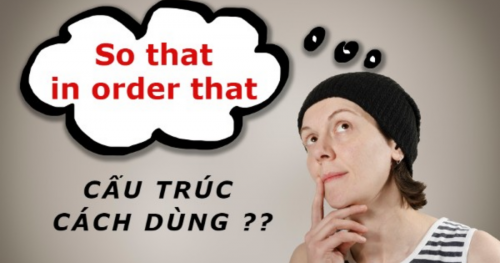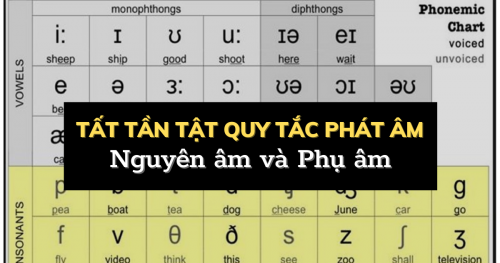Động từ Khuyết thiếu trong tiếng Anh

Bạn đã bao giờ thắc mắc khi nào dùng “Could you open the door?” hay “Can you open the door?” Can và Could khác nhau gì? Chúng thuộc loại từ gì trong câu?
Ở ví dụ trên, “can và could” được gọi là động từ khuyết thiếu hay khiếm khuyết. Trong quá trình học tiếng Anh. Bạn sẽ bắt gặp rất nhiều trường hợp sử dụng động từ khuyết thiếu như vậy. Hãy cùng cô Hoa tìm hiểu cụ thể về chủ thể ngữ pháp này nhé!
I. Động từ khuyết thiếu trong tiếng Anh
Động từ khuyết thiếu (Modal verbs) là động từ nhưng lại không chỉ hành động mà nó chỉ giúp bổ nghĩa cho động từ chính.
Tại sao lại gọi là động từ khiếm khuyết?
- Động từ không cần chia ở ngôi thứ 3 số ít: I can, She can, He can
- Không có hình thức nguyên thể hay phân từ hai giống như các động từ thường khác
- Động từ chính đứng đằng sau không chia, ở dạng nguyên thể (có hoặc không có “to” )
- Không cần trợ động từ trong câu hỏi, câu phủ định, câu hỏi đuôi…
II. Các động từ khiếm khuyết hay gặp
|
Modal Verbs |
Chức năng |
Ví dụ |
Chú ý |
|
Can |
Diễn tả khả năng hiện tại hoặc tương lai là một người có thể làm được gì, hoặc một sự việc có thể xảy ra |
You can speak Spainish. It can rain. |
Can và Could còn được dùng trong câu hỏi đề nghị, xin phép, yêu cầu. Can I ask you a question? - Có thể dùng “be able to” thay cho “can hoặc could” |
|
Could (quá khứ của “Can”) |
Diễn tả khả năng xảy ra trong quá khứ |
My brother could speak English when he was five. |
|
|
Must |
Diễn đạt sự cần thiết, bắt buộc ở hiện tại hoặc tương lai Đưa ra lời khuyên hoặc suy luận mang tính chắc chắn, yêu cầu được nhấn mạnh |
You must get up earily in the morning. You must be hungry after work hard. You must be here before 8 a.m |
Mustn’t – chỉ sự cấm đoán |
|
Have to |
Diễn tả sự cần thiết phải làm gì nhưng là do khách quan (nội quy, quy định…) |
I have to stop smoking. My doctor said that. |
Don’t have to= Don’t need to (chỉ sự không cần thiết) |
|
May |
Diễn tả điều gì có thể xảy ra ở hiện tại |
May I call her? |
-May và might dùng để xin phép. Nhưng might ít được dùng trong văn nói, chủ yếu trong câu gián tiếp: May I turn on TV? I wonder if he might go there alone. -Might được dùng không phải là quá khứ của May Where is John? I don’t know. He may/might go out with his friends. |
|
Might (quá khứ của “May”) |
Diễn tả điều gì có thể xảy ra ở quá khứ |
She might not be his house. |
|
|
Will |
Diễn đạt, dự đoán sự việc xảy ra trong tương lai Đưa ra một quyết định tại thời điểm nói |
Tomorrow will be sunny. Did you buy sugar? Oh, sorry. I’ll go now. |
Dùng Will hay Would trong câu đề nghị, yêu cầu, lời mời Will you have a cup of coffee? Would you like a cake? |
|
Would |
Diễn tả một giả định xảy ra hoặc dự đoán sự việc có thể xảy ra trong quá khứ |
She was a child. She would be upset when hear this bad news. |
|
|
Shall |
Dùng để xin ý kiến,lời khuyên. “Will” được sử dụng nhiều hơn |
Where shall we eat tonight? |
|
|
Should |
Chỉ sự bắt buộc hay bổn phận nhưng ở mức độ nhẹ hơn “Must” Đưa ra lời khuyên, ý kiến Dùng để suy đoán |
You should send this report by 8th September. You should call her. She worked hard, she should get the best result.
|
|
|
Ought to |
Chỉ sự bắt buộc. Mạnh hơn “Should” nhưng chưa bằng “Must” |
You ought not to eat candy at night.
|
|
Mức độ lịch sự trong câu yêu cầu khi dùng các động từ khiếm khuyết (được xếp từ cao tới thấp):
May I- Could/Would you (please)- Will you- Can I
>>> Xem thêm: 100 câu giao tiếp tiếng Anh hàng ngày thông dụng nhất
III. Bài tập thực hành:
1.Young people ______ obey their parents.
- a.must b. may c. will d. ought to
2.Laura, you and the kids just have dinner without waiting for me. I ______ work very hard today.
- a.can b. may c. should d. would
3. I ______ be delighted to show you round the factory.
- a.ought to b. would c. might d. can
4. Leave early so that you ______ miss the bus.
- a.didn’t b. won’t c. shouldn’t d. mustn’t
5.Jenny’s engagement ring is enormous! It ______ have cost a fortune
- a.must b. might c. will d. should
6.You ______ to write them today.
- a.should b. must c. had d. ought
7.I hope I ______ find it.
- a.will b. shall c. could d. must
8.Unless he runs he______ catch the train.
- a.will b. mustn’t c. wouldn’t d. won’t
9.______ you be in Rome tonight.
- a.will b. may c. might d. maybe
10.We ______ have time to help you tomorrow.
- a.may b. must c. will d. could.
11″______ you hand me that pair of scissors, please?”
- a.May b. Will c. Shall d. Should
12.Jeanette did very badly on the exam. She _____ harder.
- a.must have studied c. could have studied
- b.should have studied d. must studied
13.He was very lucky when he fell off the ladder. He _____ himself.
- a.could have hurt c. must have hurt
- b.should have hurt d. will have hurt
14.Marcela didn’t come to class yesterday. She _____ an accident.
- a.should have had c. must have
- b.might have d. may have had
15.John still hasn’t come out. He ______ everything for the trip now.
- a.must have been preparing c. must be preparing
- b.will be preparing d. will have prepared
16.Thomas received a warning for speeding. He _____ so fast.
- a.shouldn’t have driven c. should have
- b.would have driven d. might have driven
17.The photos are black. The X-ray at the airport _____ them.
- a.should have damaged c. would have damaged
- c.would damage d. must have damaged
18.Tom didn’t do his homework, so the teacher became very angry. He _____ his homework.
- a.must have done b. should have done
- c.might have d. will have done
19.My car stopped on the high way. It _____ out of gas
- a.may run c. must be
- b.may have run d. should have run
20.Robert arrived without his book. He _____ it.
- a.could have lost c. would have lost
- b.should have lost d. will have lost
21.”Where do you think Rooney is today?”. “I have no idea. He _____ late.”
- a.should have left c. would sleep
- b.would have sleep d. may have sleep
22.Berbatov painted his bedroomblack. It looks dark and dreary. He _____ a different color.
- a.had to choose c. must have chosen
- b.should have chosen d. could have been choosing
23.The children _____ “thank you” to you when you gave them their gifts.
- a.will have said c. should have said
- b.must say d. should say
24.If we had known your new address, we _____ to see you.
- a.came c. will come
- b.would have come d. would come
25.These two boys look identical. They _____ twins.
- a.must have been c. should be
- b.must be d. should have been
Học cách sử dụng động từ khuyết thiếu trong tiếng Anh
II.Rewrite the sentence in the same meaning:
26.Perhaps Susan know the address. (may)
- Susan ………………………………………………………………………….
27.It’s possible that Joanna didn’t receive my message. (might)
- Joanna ……………………………………………………………………..
28.The report must be on my desk tomorrow. (has)
- The report …………………………………………………………………………………….
29.I managed to finish all my work. (able)
- I …………………………………………………………………………………..
30.It was not necessary for Nancy to clean the flat. (didn’t)
- Nancy …………………………………………………………………………………………
31.The best thing for you to do is to sit down sit down. (better)
- You ………………………………………………………………………..
Đáp án:
- 1.a
- 2.c
- 3.b
- 4.b
- 5.a
- 6.c
- 7.b
- 8.c
- 9.a
- 10.c
- 11.a
- 12.b
- 13.a
- 14.d
- 15.c
- 16.a
- 17.d
- 18.a
- 19.b
- 20.a
- 21.d
- 22.b
- 23.c
- 24.b
- 25.a
- 26.Susan may know the address
- 27.Joanna mightn’t have received my message
- 28.The report has to be on my desk tomorrow
- 29.I was able to finish all my work
- 30.Nancy didn’t need to clean the flat
- 31.You had better sit down
Trên đây là toàn bộ kiến thức về động từ khuyết thiếu trong tiếng Anh! Hy vọng các bạn đã có một bài học bổ ích cùng như thu được những kiến thức cần thiết về chủ thể ngữ pháp này!
Chúc các bạn học tốt!
Nhận lộ trình FREE
-
Lịch khai giảng
-
Giáo trình tự học tiếng anh











